1. Overview
Josep Maria Carreras Coll (Josep Maria Carreras Collʒuˈzɛb məˈɾi.ə kəˈreɾəs ˈkɔʎCatalan), better known as José Carreras (José Carrerasxoˈse kaˈreɾasSpanish), born on December 5, 1946, in Barcelona, Spain, is a celebrated Catalan operatic tenor. He is particularly renowned for his powerful and mellow voice, especially in the operas of Verdi and Puccini. Carreras made his operatic debut at the age of 11 as Trujamán in Manuel de Falla's El retablo de Maese Pedro, embarking on a career that saw him perform over 60 roles in the world's leading opera houses and on numerous recordings. He achieved widespread global fame as one of The Three Tenors, alongside Plácido Domingo and Luciano Pavarotti, performing in a series of highly successful concerts from 1990 to 2003. Beyond his artistic achievements, Carreras is deeply committed to humanitarian work. Following his own miraculous recovery from leukemia in 1988, he established the José Carreras International Leukaemia Foundation (La Fundació Internacional Josep Carreras per a la Lluita contra la Leucèmia), dedicating significant efforts to advancing cancer research, supporting patients, and advocating for social welfare and cultural enrichment.
2. Early Life and Education
Josep Carreras's early life in Barcelona laid the foundation for his remarkable musical journey, marked by an early awakening to music and dedicated formal education.
2.1. Childhood and Musical Awakening
Carreras was born in Sants, a working-class district in Barcelona, on December 5, 1946. He was the youngest of three children born to Antònia Coll i Saigi and Josep Carreras i Soler. In 1951, his family briefly emigrated to Argentina in search of a better life, but they returned to Sants within a year, where Carreras spent his childhood and teenage years. He displayed an early talent for music and singing, which intensified at the age of six after watching Mario Lanza in the film The Great Caruso. According to his autobiography and numerous interviews, Carreras would incessantly sing arias to his family after seeing the film, particularly "La donna è mobile" from Verdi's Rigoletto, often locking himself in the family's bathroom for impromptu concerts when his family became exasperated. Recognizing his talent, his parents, encouraged by his grandfather Salvador Coll, an amateur baritone, found the means to provide him with music lessons. At just eight years old, he gave his first public performance, singing "La donna è mobile" accompanied by Magda Prunera, the mother of a childhood friend, on the piano, on Spanish National Radio. A recording of this performance still exists. On January 3, 1958, at the age of eleven, he made his debut at Barcelona's prestigious opera house, the Gran Teatre del Liceu, performing the boy soprano role of Trujamán in Manuel de Falla's El retablo de Maese Pedro. A few months later, he sang for the last time as a boy soprano at the Liceu in the second act of La Bohème.

2.2. Early Education and Influences
Throughout his teenage years, Carreras continued his musical studies, advancing to the Conservatori Superior de Música del Liceu, a renowned Spanish music academy. He also took private voice lessons, initially with Francisco Puig and later with Juan Ruax, whom Carreras affectionately described as his "artistic father." Following the advice of his father and brother, who believed he should have a "backup" career, he enrolled at the University of Barcelona to study chemistry. However, after two years, he left the university to fully concentrate on his singing career, a decision that proved pivotal for his future in opera.
3. Early Career and Debut
Josep Carreras's initial foray into the professional opera world was marked by significant debuts and crucial collaborations that rapidly propelled his career forward.
3.1. Operatic Debut and Early Roles
Juan Ruax encouraged Carreras to audition for what would become his first tenor role at the Liceu: Flavio in Norma, which premiered on January 8, 1970. Although a minor role, his singing caught the attention of the production's leading lady, the eminent soprano and fellow Catalan, Montserrat Caballé. Impressed by his talent, Caballé invited him to sing Gennaro with her in Donizetti's Lucrezia Borgia, which opened on December 19, 1970. This performance is considered by Carreras to be his true debut as a principal adult tenor. In 1971, he made his international debut in a concert performance of Maria Stuarda at London's Royal Festival Hall, once again performing alongside Caballé in the title role.
3.2. Mentorship and Key Collaborations
Montserrat Caballé played a crucial role in promoting and encouraging Carreras's career for many years, appearing in over fifteen different operas with him. Her brother and manager, Carlos Caballé, also managed Carreras until the mid-1990s. The 1970s saw Carreras's career progress rapidly. In late 1971, he won first prize in Parma's prestigious Voci Verdiane competition, which led to his Italian debut as Rodolfo in La bohème at the Teatro Regio di Parma on January 12, 1972. Later that year, he made his American debut as Pinkerton in Madama Butterfly with the New York City Opera. Major house debuts followed swiftly: the San Francisco Opera in 1973 as Rodolfo; the Philadelphia Lyric Opera Company in 1973 as Alfredo in La traviata; the Vienna Staatsoper in 1974 as the Duke of Mantua in Rigoletto; London's Royal Opera House in 1974 as Alfredo; the New York Metropolitan Opera in 1974 as Cavaradossi in Tosca; and La Scala, Milan, in 1975 as Riccardo in Un ballo in maschera. By the age of 28, he had already sung the tenor lead in 24 different operas across Europe and North America. He secured an exclusive recording contract with Philips, which resulted in valuable recordings of several less frequently performed Verdi operas, including Il Corsaro, I due Foscari, La battaglia di Legnano, Un giorno di regno, and Stiffelio.
Carreras's collaborations with leading sopranos and mezzo-sopranos of the era were extensive, including Montserrat Caballé, Birgit Nilsson, Viorica Cortez, Renata Scotto, Ileana Cotrubaş, Sylvia Sass, Teresa Stratas, Dame Kiri Te Kanawa, Frederica von Stade, Agnes Baltsa, Teresa Berganza, and Katia Ricciarelli. His artistic partnership with Ricciarelli began in 1972 with La bohème in Parma and continued for thirteen years, both in the recording studio and on stage. They later made a studio recording of La bohème for Philips Classics and are featured together on over 12 other commercial recordings of operas and recitals, primarily on the Philips and Deutsche Grammophon labels.
4. Operatic Career
Josep Carreras's operatic career was extensive, marked by performances in major roles at leading opera houses worldwide and significant artistic partnerships, though it also involved critical discussions about his vocal development.
4.1. Major Operatic Roles and Performances
During the 1990s, Carreras continued to perform on the operatic stage in productions such as Carmen and Fedora. He also made notable role debuts, including Samson in Samson et Dalila in Peralada in 1990, the title role in Verdi's Stiffelio in London in 1993, and the title role in Wolf-Ferrari's Sly in Zurich in 1998. However, his opera performances gradually became less frequent as he increasingly dedicated himself to concerts and recitals. His final operatic appearances at the Gran Teatre del Liceu, the opera house where his career began, were in Samson et Dalila in March 2001. He reprised the title role in Sly in Tokyo in 2002. In 2004, he performed at the Vienna State Opera in fully staged versions of the final act of Carmen and Act 3 of Sly. After a ten-year absence from the opera stage, Carreras returned in April 2014, singing the title role in Christian Kolonovits's opera, El Juez (The Judge), at its premiere in the Arriaga Theatre in Bilbao. He reprised this role in August 2014 at the Festival Erl in Austria and in January 2015 at the Mariinsky Theatre in St. Petersburg. In May 2009, Carreras announced that he would no longer perform principal opera roles but remained open to recitals.
4.2. Artistic Partnerships and Conductors
Of the many conductors Carreras worked with during his career, Herbert von Karajan had the closest artistic relationship and the most profound influence on his trajectory. Carreras first sang under Karajan in the Verdi Requiem at Salzburg on April 10, 1976. Their final collaboration was in a 1986 production of Carmen, also at Salzburg.
4.3. Vocal Development and Role Choices
With Karajan's encouragement, Carreras increasingly moved towards singing heavier lirico-spinto roles, including Aida, Don Carlos, and Carmen. Some critics have suggested that these roles were too heavy for his natural voice and may have contributed to a premature darkening of his vocal timbre and a loss of some of its initial bloom. Despite these concerns, he delivered some of his finest performances in these demanding roles.
5. The Three Tenors
Josep Carreras's involvement in "The Three Tenors" phenomenon, alongside Plácido Domingo and Luciano Pavarotti, became a global sensation that significantly broadened the appeal of opera.
5.1. Formation and Early Concerts
The first "Three Tenors" concert took place on the eve of the 1990 FIFA World Cup finals, at the Baths of Caracalla in Rome. The concert was originally conceived by Italian manager/director Mario Dradi with a dual purpose: to raise money for Carreras's newly established leukemia foundation and as a gesture of welcome from his colleagues, Plácido Domingo and Luciano Pavarotti, to mark his return to the world of opera following his recovery from leukemia. This initial performance, and the subsequent concerts, propelled Carreras to a level of fame that extended far beyond the traditional opera house.
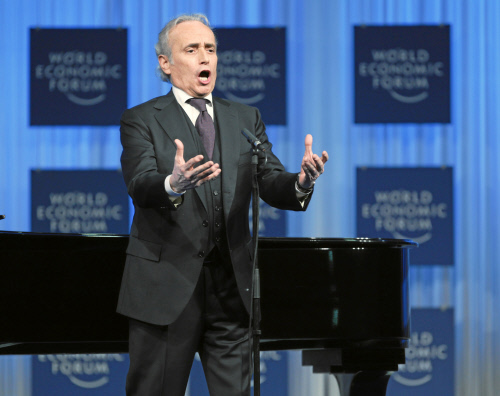
5.2. Global Impact and Legacy
The "Three Tenors" concerts achieved immense popularity worldwide. It is estimated that over one billion people watched the television broadcast of the 1994 Three Tenors concert in Los Angeles. By 1999, the CD recording from their first concert in Rome had sold an estimated 13 million copies, making it the best-selling classical recording of all time. The phenomenon played a significant role in popularizing opera for a global audience, introducing classical music to millions who might not otherwise have encountered it. The early 1990s also saw Carreras taking on the role of Musical Director for the opening and closing ceremonies of the 1992 Barcelona Olympic Games. At the closing ceremony, he famously performed the Olympic theme song "Amigos Para Siempre" in a duet with British singer Sarah Brightman, receiving a standing ovation. For Carreras, participating in the Olympics held in his hometown of Barcelona was a profound "recovery celebration" after his battle with leukemia. He also embarked on a worldwide concert tour as a tribute to his early singing hero, Mario Lanza, expressing his admiration by stating, "If I am an opera singer, opera will thank Mario Lanza."
6. Crossover and Popular Music
Carreras ventured beyond traditional opera, exploring musicals, film soundtracks, and popular music, often collaborating with artists from diverse genres, showcasing his versatility.
6.1. Musicals and Film
During the 1980s, Carreras occasionally moved outside the strictly operatic repertoire, particularly in the recording studio, with recitals of songs from zarzuela, musicals, and operettas. He made full-length recordings of two popular musicals: West Side Story (1985) and South Pacific (1986), both with Dame Kiri Te Kanawa as his co-star. The recording of West Side Story was particularly notable as Carreras was chosen and conducted by the composer himself, Leonard Bernstein, who was conducting the work for the first time in nearly 30 years. A full-length documentary was made about these recording sessions, which famously captured a moment where Carreras struggled with the syncopated rhythms and elocution in his solo on "Something's Coming", leading to relentless corrections from Bernstein. In film, Carreras portrayed the 19th-century Spanish tenor Julián Gayarre in Romanza Final (The Final Romance) in 1986. In 1987, he began working on a film version of La bohème directed by Luigi Comencini.
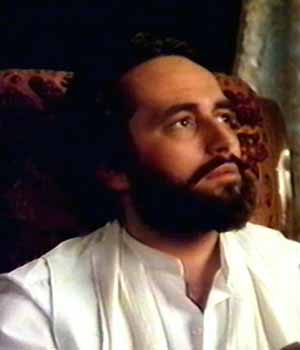
6.2. Popular Music and Cross-Genre Collaborations
Carreras's 1987 Philips recording of the Argentine folk mass, Misa Criolla, conducted by its composer, Ariel Ramírez, brought the work to a worldwide audience. By the 2000s, his recording and live concert repertoire had largely shifted towards art song, Neapolitan songs, the light classical genre, and 'easy-listening' music. He increasingly performed and recorded with artists from outside the classical music world, including Diana Ross, Edyta Górniak, Lluís Llach, Peter Maffay, Udo Jürgens, Klaus Meine, Charles Aznavour, Kim Styles, Sarah Brightman, Vicky Leandros, Jackie Evancho, Sissel Kyrkjebø, Debbie Harry, Majida El Roumi, and Giorgia Fumanti. Notably, he sang a duet titled "Light the way" with Lebanese star and UN ambassador Majida El Roumi on December 9, 2006, during the opening ceremony of the 15th Asian Games in Doha. From 2002 onwards, Carreras scaled back his live performances, focusing primarily on recitals and orchestral concerts. In an interview published in The Times on May 8, 2009, Carreras announced his decision to no longer perform principal opera roles, though he remained open to continuing with recitals.
7. Health and Recovery
Josep Carreras's life took a dramatic turn with his battle against leukemia, a challenge he overcame with remarkable resilience, leading to a determined return to the performing arts.
7.1. Diagnosis and Treatment
It was during the filming of La bohème in Paris in 1987 that Carreras received a devastating diagnosis: he was suffering from acute lymphoblastic leukemia. The prognosis was grim, with doctors giving him only a 1 in 10 chance of survival. He faced severe economic hardship due to the continuous chemotherapy and bone marrow transplant treatments. However, he recovered from the disease after undergoing a grueling treatment regimen that included chemotherapy, radiation therapy, and an autologous bone marrow transplant at the Fred Hutchinson Cancer Research Center in Seattle, United States. During his treatment, Carreras learned about the Hermosa Leukemia Foundation in Madrid, which operated a hospital where he could receive free treatment. He later discovered that this foundation had been established by his rival, Plácido Domingo, who had done so anonymously to help Carreras without hurting his pride. Deeply moved by Domingo's friendship, Carreras became close friends with him, and this experience became a significant motivation for him to establish his own foundation.
7.2. Return to Performing
Following his recovery, Carreras gradually returned to both the operatic and concert stages, embarking on a tour of comeback recitals in 1988 and 1989. He performed with Montserrat Caballé in Medea in Mérida, Spain, in 1989, and participated in the world premiere of Balada's Cristóbal Colón in Barcelona in 1989. Although his vocal skill was noted to have declined rapidly after his treatment, his deeply moving and appealing voice continued to touch many audiences, particularly in his humanitarian efforts.
8. Humanitarian Work
Josep Carreras has dedicated significant philanthropic efforts to the fight against leukemia, establishing a foundation that has become a global advocate for cancer research and patient support.
8.1. Founding the Leukaemia Foundation
Following his own recovery from leukemia, Carreras felt a profound desire to repay the debt he owed to medical science and to improve the lives and care of other leukemia sufferers. On July 14, 1988, he established the Fundació Internacional Josep Carreras per a la Lluita contra la Leucèmia, known in English as the José Carreras International Leukaemia Foundation, in Barcelona. The foundation, which publishes a tri-monthly magazine on its activities called Amigos de la Fundación, concentrates its efforts in four main areas:
- Development of clinical research into the cure and treatment of leukemia through scholarships and research grants.
- Campaigns to increase bone marrow and cord blood donation for leukemia patients requiring transplants, along with the operation of REDMO, the Spanish national registry of bone marrow donors.
- Strengthening of research and clinical infrastructures in both leading international institutions and hospitals and laboratories in the developing world.
- Provision of social services to leukemia patients and their families, including free accommodation near transplant centers.
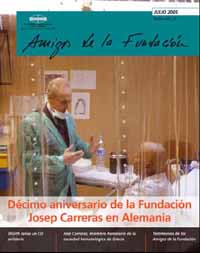
8.2. Fundraising and Advocacy
The José Carreras International Leukaemia Foundation also has affiliates in the United States, Switzerland, and Germany, with the German affiliate being the most active. Since 1995, Carreras has hosted an annual live televised benefit gala in Leipzig to raise funds for the foundation's work in Germany. This gala alone has raised well over 71.00 M EUR since its inception. Carreras also performs at least 20 charity concerts a year in aid of his foundation and other medical-related charities. He is an Honorary Member of the European Society for Medicine and the European Haematology Association, an Honorary Patron of the European Society for Medical Oncology, and a Goodwill Ambassador for UNESCO. He actively visits hospitals globally, offering encouragement to leukemia patients, and in Japan, he famously presented a teddy bear (named Luciano) to a young female patient to support her in overcoming her illness.
9. Awards and Distinctions
Josep Carreras has received numerous national and international awards, honors, and honorary degrees in recognition of his significant artistic and humanitarian contributions.
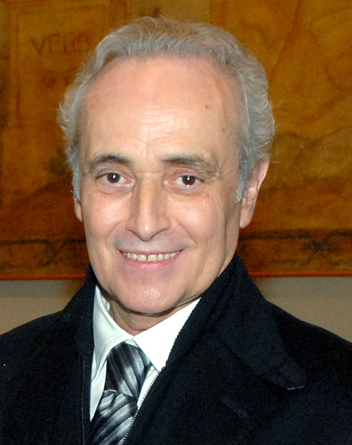
His distinctions include:
- Knight Grand Cross (First Class) of the Most Exalted Order of the White Elephant of Thailand (2019).
- Commander of the Ordre des Arts et des Lettres and Chevalier of the Légion d'honneur (France).
- Knight Grand Cross and Grand Officer of the Order of Merit of the Italian Republic (May 20, 1996, and April 3, 1991, respectively).
- Grand Decoration of Honour for Services to the Republic of Austria (1999).
- The Cruz de Oro del Orden Civil de la Solidaridad Social from Queen Sofia of Spain.
- The Prince of Asturias Prize for Art (joint winner, 1991).
- The Grand Cross of Merit from the Federal Republic of Germany.
- The Gold Medal of the Generalitat of Catalonia (June 1984).
- The Bavarian Order of Merit.
- The Steiger Award (2006).
- The St. George Order of the Semperoper in Dresden (2010).
- Honorary Medal of the city of Leipzig (December 17, 2009), awarded by the Mayor of Leipzig on the occasion of his Leukemia Fundraiser.
- An honorary degree of Doctor of Letters from Loughborough University (1993).
- The Golden Plate Award of the American Academy of Achievement (2004).
- The Brit Award for Outstanding Contribution to Music (2009).
On February 23, 2004, the Austrian Post Office issued a 1 EUR stamp to commemorate the 30th anniversary of his debut at the Vienna State Opera. He holds Honorary Doctorates from numerous universities worldwide, including the University of Barcelona and Miguel Hernández University (Spain); Napier, Loughborough, and Sheffield universities (United Kingdom); the Mendeleev Russian University of Chemistry and Technology (Russia); the University of Camerino (Italy); Rutgers University (United States); the University of Coimbra (Portugal); the National University of Music Bucharest (Romania); Philipps-Universität Marburg (Germany, May 3, 2006); University of Saarland (2012); the University of Pécs (Hungary); Kyunghee University (Korea); and the University of Porto (Portugal). In Spain, a central plaza in Sant Joan d'Alacant bears his name, as do two theaters: the Auditori Josep Carreras in Vila-seca (near Tarragona) and The Teatro Josep Carreras in Fuenlabrada.
10. Voice and Musical Style
Josep Carreras's voice was widely celebrated for its unique qualities and expressive power, though its evolution and role choices also became subjects of critical discussion.
10.1. Vocal Qualities and Timbre
In its prime, Josep Carreras's voice was considered one of the most beautiful tenor voices of his era. The Spanish critic Fernando Fraga described it as a lyric tenor with the generosity of a spinto, possessing "a noble timbre, richly coloured and sumptuously resonant." This was particularly true of the middle range of his voice. Fraga, along with Carreras himself, noted that even in his youth, the high notes of the tenor range were somewhat problematic for him, a challenge that became more pronounced as his career progressed. His voice was often referred to as the "silver tenor" for its unique qualities. He was known for his ability to smoothly transition from fortissimo (loud) to pianissimo (soft) expressions, a skill that highlighted his beautiful voice and shone in delicate emotional portrayals.
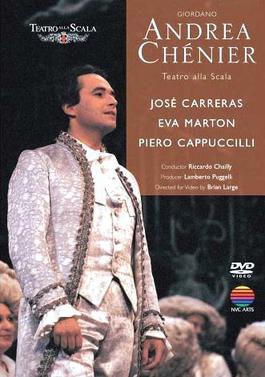
10.2. Expressiveness and Interpretation
Like his idol, Giuseppe di Stefano, Carreras was celebrated for the beauty and expressiveness of his phrasing and for his passionate delivery. These qualities are perhaps best exemplified in his 1976 recording of Tosca with Montserrat Caballé in the title role and conducted by Sir Colin Davis. Critics have suggested that his assumption of heavier spinto roles, such as Andrea Chénier, Don José in Carmen, Don Carlo, and Alvaro in La forza del destino, placed a strain on his naturally lyric instrument. This strain may have caused his voice to prematurely darken and lose some of its original bloom. Nevertheless, he produced some of his finest performances in these demanding roles. For instance, The Daily Telegraph wrote of his 1984 Andrea Chénier at London's Royal Opera House: "Switching effortlessly from the lyric poet Rodolfo in La Bohème a few weeks ago to the heroic poet Chenier, the Spanish tenor's vocal artistry held us spellbound throughout." Carl Battaglia, reviewing his 1985 performance in Andrea Chénier at La Scala (preserved on DVD), noted that Carreras dominated the opera "with formidable concentration and a cleverly refined vocal accent that imparts to this spinto role an overlay of intensity lacking in his essentially lyric tenor." However, Carl H. Hiller's review of the same La Scala performance in Opera magazine also observed that while in the quiet phrases of the score "he could display all the tonal mellowness of which this perhaps most beautiful tenor voice of our time is capable," he encountered difficulty with the high loud notes, which sounded strained and uneasily produced.
11. Recordings
Josep Carreras has an extensive discography and videography, including numerous commercial recordings from the peak years of his career, as well as many performances preserved on private recordings.
11.1. Complete Operas
This is a representative selection of notable commercial recordings of complete operas featuring José Carreras:
- Bizet: Carmen (Agnes Baltsa, José Carreras, Leona Mitchell, Samuel Ramey, The Metropolitan Opera Orchestra, James Levine)
- Bizet: Carmen (Agnes Baltsa, José Carreras, Katia Ricciarelli, José van Dam, Berliner Philharmoniker, Herbert von Karajan)
- Donizetti: L'elisir d'amore (Katia Ricciarelli, José Carreras, Leo Nucci, Susanna Rigacci, Domenico Trimarchi, Coro della RAI di Torino, Orchestra Sinfonica Della Rai Di Torino, Claudio Scimone)
- Donizetti: Lucia di Lammermoor (Montserrat Caballé, José Carreras, Samuel Ramey, New Philharmonia Orchestra, Jesús López-Cobos)
- Giordano: Andrea Chénier (José Carreras, Piero Cappuccilli, Eva Marton, Nella Verri, Orchestra del Teatro alla Scala, Riccardo Chailly)
- Halévy: La Juive (June Anderson, Julia Varady, José Carreras, Philharmonia Orchestra, Antonio de Almeida)
- Massenet: Werther (José Carreras, Frederica Stade, Isobel Buchanan, Thomas Allen, Robert Lloyd, Orchestra of the Royal Opera House, Covent Garden, Colin Davis)
- Puccini: La Bohème (Katia Ricciarelli, José Carreras, Chorus of the Royal Opera House, Covent Garden, Orchestra of the Royal Opera House, Covent Garden, Colin Davis)
- Puccini: Manon Lescaut (Kiri Te Kanawa, José Carreras, Paolo Coni, Teatro Comunale di Bologna, Riccardo Chailly)
- Puccini: Madama Butterfly (Mirella Freni, Teresa Berganza, José Carreras, Juan Pons, Philharmonia Orchestra, Giuseppe Sinopoli)
- Puccini: Tosca (Montserrat Caballé, José Carreras, Ingvar Wixell, Chorus of the Royal Opera House, Covent Garden, Orchestra of the Royal Opera House, Covent Garden, Colin Davis)
- Puccini: Turandot (Eva Marton, José Carreras, Katia Ricciarelli, John-Paul Bogart; 2008 remaster of 1983 Harold Prince video production at Vienna State Opera House, Lorin Maazel)
- Rossini: Otello (Frederica von Stade, Nucci Condò, José Carreras, Salvatore Fisichella, Gianfranco Pastine, Samuel Ramey, Ambrosian Chorus, Philharmonia Orchestra, Jesús López Cobos)
- Saint-Saëns: Samson et Dalila (Agnes Baltsa, José Carreras, Jonathan Summers, Simon Estes, Paata Burchuladze, Bavarian Radio Symphony Orchestra and Chorus, Sir Colin Davis)
- Strauss: Der Rosenkavalier (Frederica von Stade, Evelyn Lear, Ruth Welting, Jules Bastin, Derek Hammond-Stroud, José Carreras, Rotterdam Philharmonic Orchestra, Edo de Waart)
- Verdi: Un ballo in maschera (Montserrat Caballé, José Carreras, Ingvar Wixell, Chorus of the Royal Opera House, Covent Garden, Orchestra of the Royal Opera House, Covent Garden, Colin Davis)
- Verdi: Il Corsaro (Montserrat Caballé, Jessye Norman, José Carreras, New Philharmonia Orchestra, Lamberto Gardelli)
- Verdi: Don Carlo (José Carreras, Agnes Baltsa, Fiamma Izzo D'amico, Piero Cappuccilli, Ferruccio Furlanetto, Berlin Philharmonic, Herbert von Karajan)
- Verdi: I due Foscari (José Carreras, Piero Cappuccilli, Katia Ricciarelli, Samuel Ramey, ORF Symphony Orchestra, Lamberto Gardelli)
- Verdi: La forza del destino (Sesto Bruscantini, José Carreras, Montserrat Caballé, Piero Cappuccilli, Nicolai Ghiaurov, Orchestra del Teatro alla Scala, Giuseppe Patanè)
- Verdi: Un giorno di regno (Jessye Norman, Fiorenza Cossotto, José Carreras, Ingvar Wixell, Royal Philharmonic Orchestra, Lamberto Gardelli)
- Verdi: I lombardi alla prima crociata (José Carreras, Ghena Dimitrova, Carlo Bii, Silvano Carroli, Orchestra del Teatro alla Scala, Gianandrea Gavazzeni)
- Verdi: Rigoletto (Thomas Allen, Luciana Serra, José Carreras, Agnes Baltsa, Evgeny Nesterenko, José van Dam, Berliner Philharmoniker, Herbert von Karajan)
- Verdi: Simon Boccanegra (Piero Cappuccilli, Mirella Freni, José Carreras, Nicolai Ghiaurov, José van Dam, Orchestra del Teatro alla Scala, Claudio Abbado)
- Verdi: Stiffelio (Sylvia Sass, José Carreras, Matteo Manuguerra, ORF Symphony Orchestra, Lamberto Gardelli)
11.2. Recitals, Sacred Music and Crossover
A selection of his recordings outside of complete operas includes:
- Various: José Carreras Sings Catalan Songs
- Bernstein: West Side Story (with Kiri Te Kanawa, Tatiana Troyanos, Kurt Ollmann, Marilyn Horne, Leonard Bernstein)
- Puccini: Messa di Gloria (with Hermann Prey, London Philharmonic Orchestra, Claudio Scimone)
- Ramirez: Misa Criolla, Navidad Nuestra
- Rodgers: South Pacific (with Kiri Te Kanawa, Sarah Vaughan, Mandy Patinkin, London Symphony Orchestra, Jonathan Tunick)
- Verdi: Messa da Requiem (with Anna Tomowa-Sintow, Agnes Baltsa, José Van Dam, Vienna Philharmonic, Herbert von Karajan)
- Various: Ave Maria (with Vienna Boys Choir, Vienna Symphony Orchestra, Uwe Christian Harrer)
- Various: José Carreras - The Golden Years (arias and songs by Puccini, Verdi, Donizetti, Massenet, Bizet, Lehár, Handel, Gastoldi, Giordano, Tosti, Cardillo, Denza, de Curtis, Lara, d' Hardelot, Brodszky, Bernstein, Lloyd Webber)
- Various: The Very Best of José Carreras (arias from Aida, Macbeth, Cavalleria rusticana, Pagliacci, Turandot, Don Carlo, Carmen, Faust, Roméo et Juliette, Polyeucte, Le Cid, Sappho, Hérodiade, La Juive, L'Africaine, Le Roi d'Ys, La Périchole)
- Various: Passion
- Various: Pure Passion
- Various: Around the world
- Various: Belle Epoque (Tagliaferri, Satie, Puccini, Zemlinsky, Schreker,...)
- Various: Mediterranean Passion
- Various: 25 Meraviglioso
- Various: Christmas in Moscow (with Plácido Domingo, Sissel)
- Various: The Metropolitan Opera Centennial Gala
12. Personal Life
Josep Carreras's personal life has been shaped by significant family relationships and experiences, including his marriages and the profound influence of his parents.
12.1. Family and Relationships
Throughout his childhood in Barcelona, Carreras's father, Josep Carreras i Soler, worked as a traffic policeman. He had initially been a French teacher, but his involvement on the Republican side during the Spanish Civil War led to him being barred from teaching after the Franco government came to power in 1939. His mother, Antonia Coll i Saigi, ran a small hair-dressing salon, where a young Carreras often sang to customers for pocket money. Carreras was very close to his mother, who was convinced he would one day become a great singer. Her death from cancer when he was 18 deeply affected him; he later stated that "even now, every time I go on stage, I always, always, have a quick thought for her." Carreras is a Catholic, with the baptismal name Joseph. In 1971, Carreras married Mercedes Pérez, and they had two children: a son, Albert, born in 1972, and a daughter, Julia, born in 1978. Their marriage ended in divorce in 1992. In 2006, Carreras married Jutta Jäger, but they separated in 2011. Carreras's nephew, David Giménez Carreras, is a conductor and Director of the Orquestra Simfònica del Vallès. David Giménez Carreras has conducted many of Carreras's concerts since the late 1990s, as well as his opera performances, including Sly at the Gran Teatre del Liceu in June 2000. Carreras is known for his deep affection for Korea, making frequent visits for concerts. His beloved dog is named "Vincero," a reference to the famous aria "Nessun dorma" (Vincerò means "I will win").
13. Legacy and Impact
Josep Carreras's legacy extends beyond his extraordinary vocal performances, encompassing his significant influence on the classical music world and his enduring social and humanitarian contributions.
13.1. Cultural and Artistic Influence
Carreras's unique, passionate, and earnest singing style was his greatest asset, allowing him to rise to stardom alongside Pavarotti and Domingo, despite occasional instabilities in his high notes and vocal volume. His youthful appearance also contributed to his appeal. Originally possessing a light lyric voice, he successfully transitioned to heavier, more dramatic spinto roles, earning high acclaim. The global success of "The Three Tenors" concerts played a crucial role in popularizing opera for a wider audience, introducing classical music to millions worldwide. His involvement as Musical Director for the 1992 Barcelona Olympic Games, where he performed the theme song "Amigos Para Siempre," further cemented his cultural impact. The Swiss luxury jeweler Chopard released a "José Carreras Model" watch, with a portion of the sales proceeds donated to the José Carreras International Leukaemia Foundation, reflecting his widespread recognition and the integration of his humanitarian work with his public persona. He is also mentioned in popular culture, such as in Kirino Natsuo's novel "Tamashii Moe," where a character is a fan of "Jose-sama." While his primary activity was in Italian and French opera, unlike Domingo, he was not as active in German opera, though some recordings exist of his German singing in works by Sinopoli and Johann Strauss.
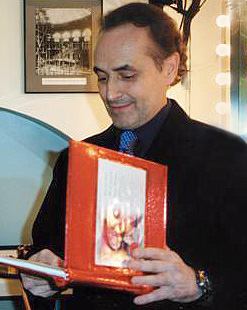
13.2. Social and Humanitarian Legacy
Carreras's most profound and enduring legacy lies in his humanitarian work. After his miraculous recovery from leukemia, he dedicated himself to supporting others battling the disease, establishing the José Carreras International Leukaemia Foundation in 1988. This foundation has become a vital force in advancing leukemia research, supporting bone marrow donation campaigns, and providing social services to patients and their families worldwide. His annual televised benefit galas in Leipzig have raised tens of millions of euros, directly contributing to research and patient care. Carreras actively visits hospitals globally, offering encouragement to leukemia patients, symbolizing hope and resilience for countless individuals and families affected by cancer. His commitment to philanthropy, born from his personal struggle, transformed a private battle into a public mission, making him a global advocate for health and human well-being.